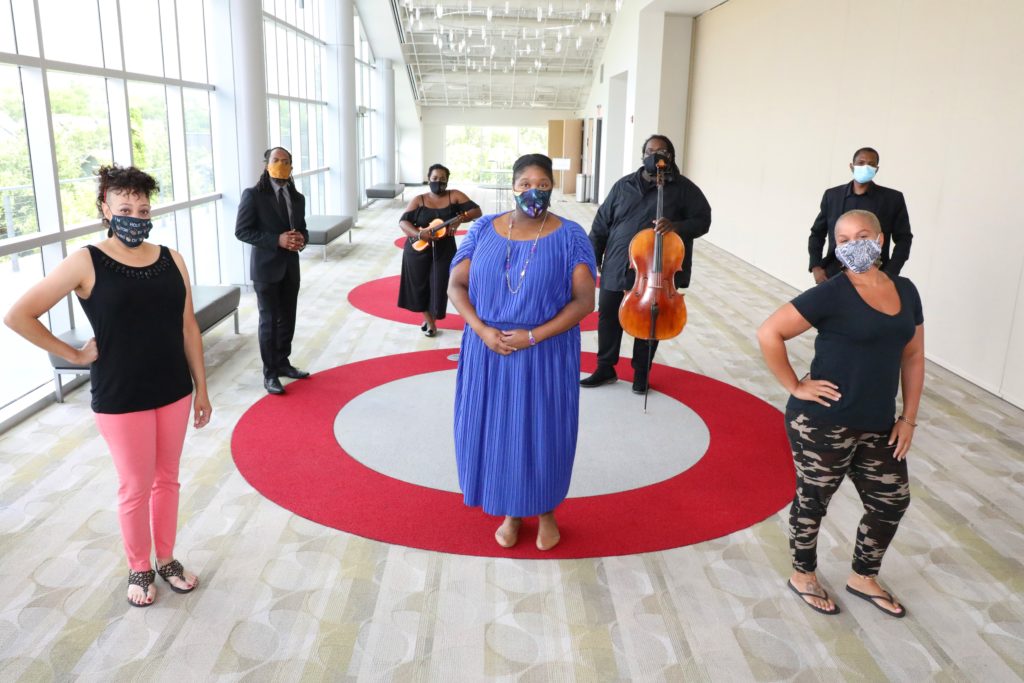
Across Nashville, an entire year’s worth of artistic commissions and performances were planned to celebrate this year’s centennial of the 19th Amendment’s ratification — and many have been postponed. But one new work, called One Vote Won, is still having its premiere digitally, courtesy of Nashville Opera.
The opera features a woman named Gloria, played by soprano Tamica Nicole. Gloria isn’t convinced that she needs to participate in an election. She doesn’t see her own place in the process of voting, according to librettist Mary McCallum.
It’s a common feeling: On average, less than 60% of eligible voters participate in presidential elections, and even fewer in midterms or local elections. Black residents, have faced a long, troubled history of poll taxes and literacy tests, and even now Black and Latino voters face longer wait times at their polling places, according to a recent analysis.
For Gloria, voting seem futile against practical issues, McCallum says.
“There’s still poverty. There’s still racism. There are people without health insurance — people who, even though they work, they can’t pay their bills, you know, student loans piling up,” McCallum says. “So all of these things that weigh on people in general … go to her argument as to, ‘Why should I make this effort to go out and vote?’ ”
In one aria Gloria asks: “When has it ever made a difference, or when has anyone’s vote made a difference? If it did, why do we still have these things?”
But Gloria will meet an otherworldly conscience, in the form of Freedom Rider and student sit-in organizer Diane Nash, as well as suffragist-turned-educator Frankie Pierce. The women tell her their own stories: how Diane Nash led lunch counter sit-ins, how Frankie Pierce worked with the suffragettes to get a school built for young Black girls — and how a vote carries power.
For each of the three Black women in the opera, composer Dave Ragland has woven a quilt of sound from the popular styles of each time period represented. The music surrounding Pierce’s 1920s character echoes Bessie Smith and dance bands. Ragland points to “A Good Man is Hard to Find” and the ragtime piano of Scott Joplin.
In Diane Nash’s setting of 1960s, post-Harlem Renaissance, Ragland pays musical tribute to the first generation of Black women graduated from western conservatories — composers like Julia Perry and Undine Smith Moore. And today’s sound for Gloria is modern, but still somewhat timeless, resonating with Robert Glasper and Layla Hathaway.
 A. Popolo Nashville Opera
A. Popolo Nashville OperaKonson Patton, piano; Shelly Blair, violin; Dave Ragland, composer; Cremaine Booker, cello
The story of disenfranchisement and the fight for rights coming from three black women serves as a timely reminder that as the country celebrates the 19th Amendment, not everyone was immediately able to vote, much less gain equal power in America. As McCallum says, it was just one piece of the puzzle.
In Frankie Pierce’s story, after she spoke to the suffragists, she was not allowed to join them at the hotel for dinner.
“She made progress,” McCallum says, “but there was still a long way to go.”
The work is Nashville Opera’s first commission in the company’s history, and with it, they’ve developed a fully homegrown product: Frankie Pierce and Diane Nash worked for equal rights in Nashville; Ragland and McCallum live here, as do all three members of the cast. That doesn’t happen too often in opera, a genre where the performers often travel the world.
And keeping it local has meant that despite the pandemic, the show could go on, at least in digital form.
With concert halls closed, the opera will be broadcast through the Nashville Opera’s website, as the opening production of its 40th anniversary season. This isn’t the usual opera experience, but it means there’s no limit on the number of people who can watch, at their convenience, from home. Schools can also broadcast the opera to their students.
So the voices of Diane Nash and Frankie Pierce just might continue to reach young voters from now on.
One Vote Won runs in a live stream on Nashville Opera’s website September 25-27.

